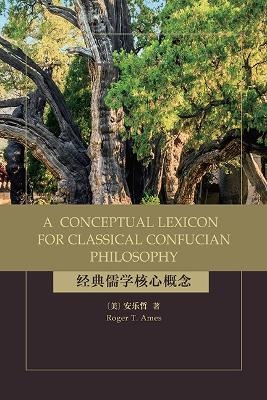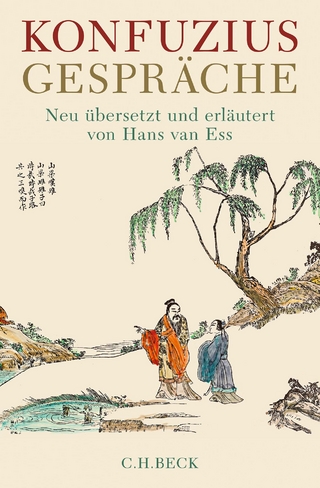
A Conceptual Lexicon for Classical Confucian Philosophy
State University of New York Press (Verlag)
978-1-4384-9081-6 (ISBN)
Roger T. Ames is Humanities Chair Professor in the Philosophy Department at Peking University in China and Professor of Philosophy Emeritus at the University of Hawaii. His published works include collaborations on translations of the Chinese philosophical canons and several interpretive studies.
Introduction
霸 ba. “Hegemon.”
本 ben. “Root, trunk.”
誠 cheng. “Sincerity, with integrity, resolve, (co-)creativity.”
恥 chi. “A sense of shame.”
道 dao. “The proper way, way-making, dao.”
德 de. “Moral virtuosity, excelling morally, virtuality.”
惡 fa. “Standards, norms, laws, models.”
和 he. “Optimal harmony, optimizing symbiosis.”
幾 ji. “Inchoate, incipient beginnings.”
祭 ji. “Sacrificing, sacrifice.”
諫 jian. “Remonstrating, remonstrance.”
兼愛 jian’ai. “Inclusive care, inclusive concern.”
教 jiao. “Teaching, education.”
精神 jingshen. “Spirituality, vigor, vitality, mystery.”
敬 jing. “Respecting, revering, seriousness.”
靜 jing. “Sustained equilibrium.”
君子 junzi. “Exemplary persons, ruler, prince, lord.”
樂 le (also pronounced yao when transitive). “Enjoyment, making the music of enjoyment.”
類 lei. “Categories, groupings.”
禮 li. “Ritual propriety in one’s roles and relations, ritual practices, ‘social grammar, rites, customs, etiquette, propriety, morals, rules of proper behavior, reverence’.”
理 li. “Patterning, coherence.”
利 li. “Benefitting, profiting, personal advantage.”
倫 lun. “Order, relation, category, class.”
美 mei. “Beautiful.”
民 min. “The common people.”
命 ming. “Commanding, ordering, command, mandate, the propensity of things, the force of circumstances.”
明 ming. “Acuity, brilliance.”
名 ming. “Naming, making a name for yourself, reputation.”
內外 neiwai. “Inner and outer, inside and outside.”
氣 qi. “Vital energy, qi.”
情 qing. “Emotions, passions, feelings, the way things are, situation, circumstances.”
仁 ren. “Consummate persons, consummate conduct.”
儒 ru. “Confucianism, Ruism, scholar-teacher, literati tradition.”
善 shan. “Felicity, efficacy, behaving well, auspicious conduct.”
上帝 shangdi. “High god(s).”
神 shen. “Heavenly gods, ancestors, spirituality, vigor, vitality, mystery.”
身 shen. “Lived, social body.”
生 sheng. “Living, growing, birthing.”
聖(人)sheng or shengren. “Sage, sagacity.”
慎其獨 shenqidu. “Internalizing and consolidating virtuosic conduct as one’s habituated disposition for action, being circumspect when dwelling alone.”
士 shi. “Warrior, retainer, knight, scholar-official.”
勢 shi. “Purchase, momentum, configuration.”
始 shi. “Fetal beginning, natal beginning, genealogical beginning.”
恕 shu. “Putting oneself in the other’s place, deference, empathy, dramatic rehearsal.”
術 shu. “Techniques of rulership.”
思 si. “Thinking, reflecting.”
四端 siduan. “The four inclinations.”
太極 taiji. “The furthest reach.”
體 ti. “Lived body, discursive body, embodying.”
天 tian. “Tian, conventionally ‘Heaven’.”
天命 tianming.
天志 tianzhi. “The purposes or intent of tian.”
體用 tiyong. “Reforming and functioning, trans-form-ing.”
同 tong. “Sameness, similarity.”
王 wang. “King, True King.”
萬物 wanwu. “The ten thousand things, the ten thousand processes or events, the myriad things or happenings.”
文 wen. “The written word, patterns, culture, refinement, King Wen.”
文化 wenhua. “Culture, enculturation.”
無 wu.
無極 wuji.
無爲 wuwei. “Noncoercive acting.”
五行 wuxing. “Five modes of virtuosic conduct, the five phases.”
象 xiang. “Figuring, figuring out, configuring, figure, imaging, imagining, image.”
孝 xiao. “Family reverence, filial piety.”
小人 xiaoren. “Petty and mean persons.”
孝悌 xiaoti. “Family reverence and fraternal deference.”
心 xin. “Heartmind, bodyheartminding, thinking and feeling.”
信 xin. “Making good on one’s word, living up to one’s word.”
性 xing. “Natural human propensities.”
虛 xu. “Emptiness.”
學 xue. “Teaching and learning.”
易 yi. “Changing, exchanging, ease.”
一 yi. “One, uniqueness, continuity.”
義 yi. “Optimal appropriateness, meaning.”
陰陽 yinyang. “Yin and yang.”
勇 yong. “Courage, bravery, vigor, vitality, boldness, fierceness.”
友 you. “Friend, friendship.”
有無 youwu. “Something and nothing, determinate and indeterminate, presence and absence.”
樂 yue. “Music.”
正 zheng. “Proper, acting properly.”
政 zheng. “Proper governing, effecting sociopolitical order.”
正名 zhengming. “Using names properly.”
知/智 zhi. “Living wisely, realizing, wisdom, knowing.”
志 zhi.
直 zhi.
質 zhi. “Native temperament, raw stuff, basic disposition.”
自然 ziran. “Self-so-ing, so-of-itself, spontaneity.”
中 zhong. “Center, balance, focus, equilibrium.”
忠 zhong. “Conscientiousness, doing one’s utmost, loyalty.”
中庸 zhongyong. “Focusing the familiar, hitting the mark in the everyday, making the ordinary extraordinary.”
主客 zhuke. “Subject and object, subjectivity and objectivity.”
Bibliography of Earlier Glossaries
Bibliography of Works Cited
Acknowledgements
| Erscheinungsdatum | 03.10.2022 |
|---|---|
| Reihe/Serie | SUNY series in Chinese Philosophy and Culture |
| Verlagsort | Albany, NY |
| Sprache | englisch |
| Maße | 152 x 229 mm |
| Gewicht | 227 g |
| Themenwelt | Geisteswissenschaften ► Philosophie ► Östliche Philosophie |
| Geisteswissenschaften ► Religion / Theologie ► Weitere Religionen | |
| ISBN-10 | 1-4384-9081-X / 143849081X |
| ISBN-13 | 978-1-4384-9081-6 / 9781438490816 |
| Zustand | Neuware |
| Haben Sie eine Frage zum Produkt? |
aus dem Bereich


